Some of the junior doctors preparing to strike for five-days this month over pay could be earning upwards of £100,000 a year, according to new calculations.
Rebranded as ‘resident doctors’ in September last year, those working a 40-hour week plus a full on-call rota may be making six-figure annual salaries, The Telegraph reported.
Earlier this week, the British Medical Association (BMA) announced that up to 50,000 resident doctors in England would walk out for five consecutive days from 7am on July 25, in a dispute over pay.
However, new polling suggests that the strike does not have the support of the British public.
Only just over a third (36 per cent) of those surveyed supported the mass industrial action, which would see a large number of routine care appointments postponed in order to keep A&E fully staffed.
The poll, conducted by YouGov on behalf of The Times, found that nearly half (49 per cent) of the population opposes the walkout.
The survey also found that 43 per cent would support legislation that made it illegal for doctors to go on strike while 54 per cent of respondents said that the pay rise sought by the BMA was unaffordable.
That is a dramatic decrease in support compared to the previous round of industrial action by doctors, who staged a five-day strike between June 27 and June 2 last year.
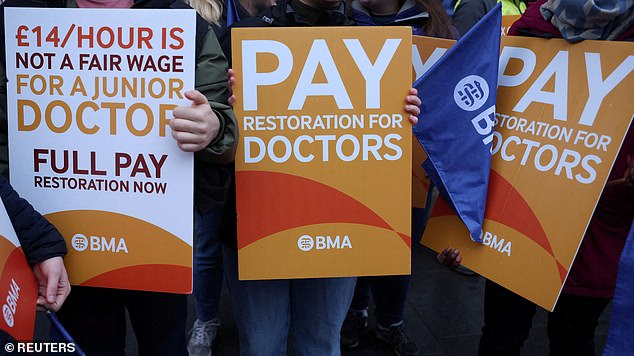
The British Medical Association (BMA) announced earlier this week that resident doctors in England and wales – formerly junior doctors – will take industrial action on consecutive days from 7am on July 25. File picture
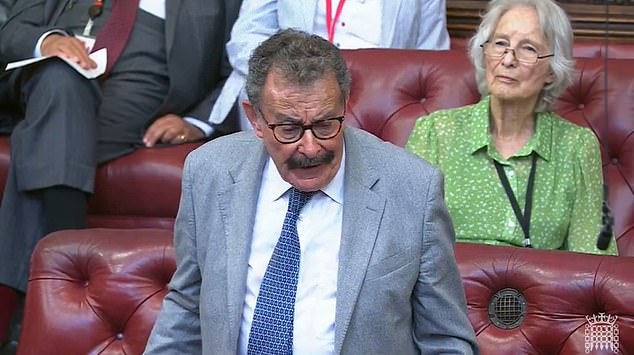
IVF pioneer Lord Winston dramatically quit the BMA on Friday with a warning that ‘shameful’ strikes could cause deaths
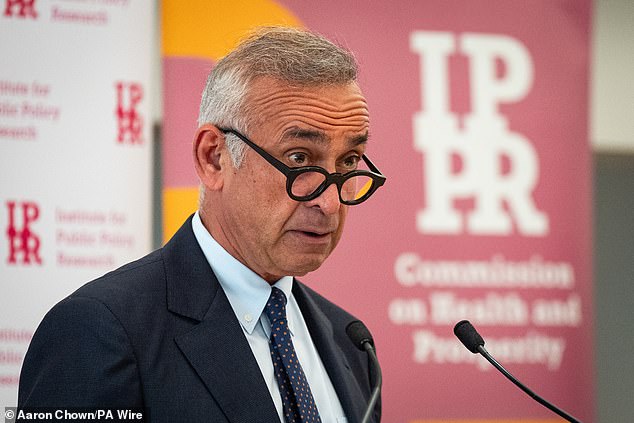
Lord Ara Darzi, 65, a former health minister and surgeon, said the ‘highly dangerous’ walkout could damage the public’s trust in doctors
Adding to the crescendo of voices discouraging the strike, two of the nation’s most well-known doctors have also joined calls for the BMA to reconsider its plans as they warned walkouts could cause irreparable harm to public trust in the profession.
Lord Ara Darzi, 65, a former health minister and surgeon, followed calls made by Professor Robert Winston, a Labour peer, who told the Times the ‘highly dangerous’ walkout could damage the public’s trust in doctors.
Professor Winston said: ‘Strike action completely ignores the vulnerability of people in front of you.
‘Doctors need to be reminded that every time they have a patient in front of them, they have someone who is frightened and in pain. It’s important that doctors consider their own responsibility much more seriously.’
Lord Darzi, 65, told the same newspaper: ‘Doctors have a special place in society. The public’s trust in doctors is earned, not guaranteed.
‘I fear it will never recover if the BMA go ahead with strikes that are plainly unjustifiable.’
Meanwhile, Professor Sir Stephen Powis, who is set to leave his post as NHS England national medical director imminently, warned the BMA to ‘think really hard’ about whether the industrial action is justified.
In his final interview before retiring, Sir Stephen, 64, told the newspaper the walkout would cause ‘tens of thousands of appointments and procedures’ to be cancelled.
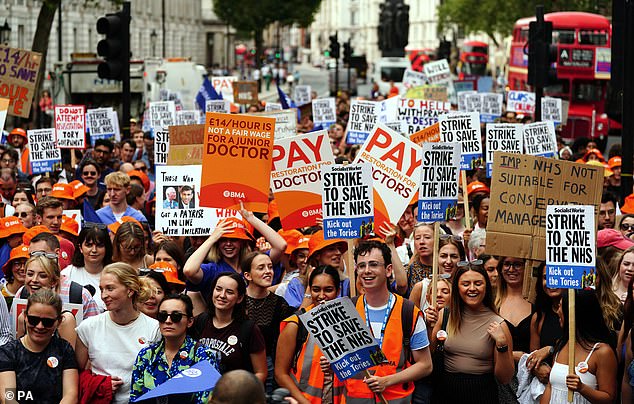
Thousands of medics demanding pay hikes of up to 29 per cent will walk out from July 25 to July 30. Pictured: Resident doctors during a rally outside Downing St at a previous strike in August 2023

Yesterday, Health Secretary Wes Streeting warned resident doctors the public will ‘not forgive them’
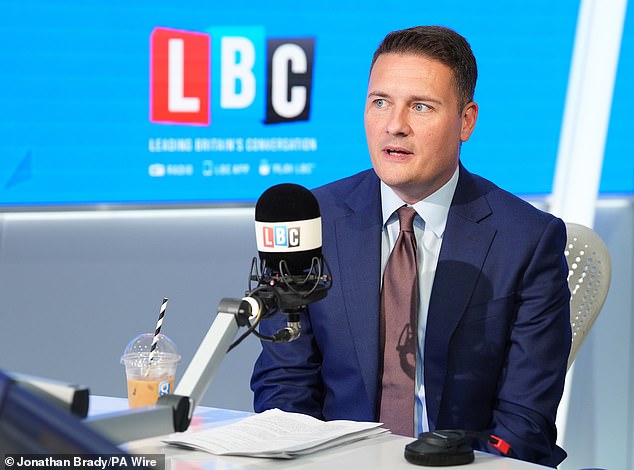
Resident doctors in England and Wales have dismissed a suggestion from health secretary Wes Streeting (pictured) that their pensions could be trimmed to fund pay demands
The pair’s calls echoed those made by Prof Winston, 84, who said he resigned from the BMA on Thursday.
In a statement on Friday, a BMA spokesman said it is ‘disappointing’ when any of its 195,000 members resign, but said resident doctors are beginning their careers ‘more than 20% worse off in real terms than their counterparts in 2008’.
The spokesman added: ‘We’re sure that doctors who dedicated their lives to the health of the nation want to safeguard the profession and the NHS for the future.
‘This means improving pay and conditions so that resident doctors stay in the health service and the UK to become expert clinical leaders, running entire services and innovating treatments.
‘Doctors take their professional obligations incredibly seriously, and the decision to strike is not made lightly.
‘But with nine out of 10 of our resident doctor members who voted backing industrial, it’s clear that there is support for doing what is necessary to fight to restore pay.
‘Of course, no strikes have to happen, and no care needs to be disrupted, if the Health Secretary meets with us to discuss the ‘journey’ to pay restoration as he so often called it in opposition.’
The BMA is demanding a 29 per cent increase in wages for its resident doctors in order to stave off strikes, although that figure is controversial.

The BMA is demanding a 29 per cent increase in wages for its resident doctors (pictured) in order to stave off strikes, although that figure is controversial since it is calculated using the retail price index – a statistic no longer used by the government since 2013
They say that is necessary since in real terms pay for junior doctors has dropped by 21 per cent over the last 17 years – the same as if they worked for free for a fifth of their time.
However, the professional body based that number on the retail price index measure of inflation, a statistic jettisoned by the UK government in 2013.
Junior doctors start on £38,831 a year following the government’s decision to award them an above-inflation rise in May this year.
But once residents are in ST8, their final training stage, annual wages can be as high as £73,992 a year.
That means if a junior doctor works a regular 40-hour week but also does significant amounts of ‘on-call’ locum work then they can rake in as much as £100,000.
Health secretary Wes Streeting posted about the forthcoming strike action on X, calling it ‘unreasonable’ and ‘unnecessary’.
Hewrote: ‘We negotiated and delivered pay rises worth 28.9 per cent. This year’s pay award was the highest in the entire public sector.
‘We cannot afford to re-open that pay award. I have offered talks without any preconditions. The BMA is refusing. Unreasonable. Unnecessary.’











